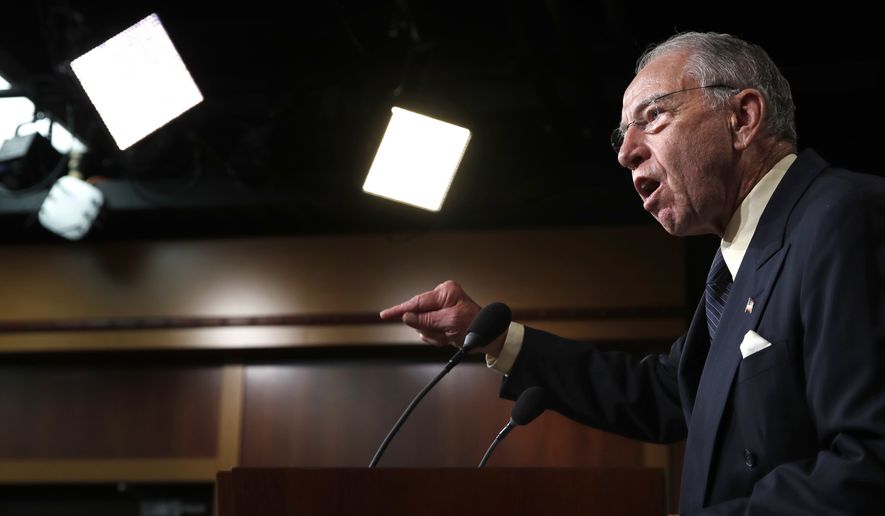She’s not a senator, but Cynthia Nance plays an enormous role in shaping the debate over some of President Trump’s judicial picks.
Ms. Nance, former dean of the University of Arkansas School of Law, handles the American Bar Association’s judicial ratings for nominees to federal courts in North and South Dakota, Nebraska, Minnesota, Iowa, Missouri and Arkansas, which make up the federal 8th Circuit.
The ABA’s role is one the more opaque parts of the process, but Republicans are pushing it into the light, accusing her of allowing personal bias, particularly a fealty to abortion rights, to color her ratings.
The ABA recently rated Jonathan Kobes, a Trump pick to sit on the 8th Circuit Court of Appeals, “not qualified,” saying he didn’t have a long enough record of legal writings.
And a year earlier, Ms. Nance led the ABA review committee that rated another Trump pick, Leonard Steven Grasz, “not qualified.” Judge Grasz would win confirmation, but not before accusing the Nance-led panel of inappropriate questions on abortion and referring to him as “you guys” — which he took as a pejorative reference to Republicans.
To Senate Judiciary Committee Chairman Charles E. Grassley, the treatment has gone overboard.
He said Ms. Nance’s left-leaning activism dates back more than a decade, including opposing Justice Samuel A. Alito’s confirmation despite the ABA rating him “unanimously well qualified.”
She also has retweeted comments on Twitter mocking the late Justice Antonin Scalia and his view of originalism, the Iowa Republican said.
In addition, the law professor also wrote a letter to the Obama administration opposing legal protections for religious organizations such as the Little Sisters of the Poor, which challenged Obamacare’s contraceptive mandate.
The ABA declined to provide a statement about Ms. Nance, and she didn’t respond to a request for comment.
But in written testimony to the committee submitted last November after the backlash over her interview with Mr. Grasz, she acknowledged discussing partial birth abortion with the nominee, who wrote a 1999 law review article on the issue.
“During my interview with Mr. Grasz, we discussed a wide range of subjects, in accordance with the procedures of our committee,” she said in her written statement, adding she received comments from Mr. Grasz’s peers, which made her concerned about his judicial temperament. “I conducted all interviews professionally and objectively with the sole purpose of gaining a full understanding of the nominee,” she said.
Ms. Nance was not the only evaluator of Mr. Grasz, as another colleague on the committee also did a report. He was the one who sparred with Mr. Grasz over the use of “you guys.”
The two reports were submitted to the 15 members of the ABA’s Standing Committee for review, discussion and a vote.
Max Brantley, senior editor for the Arkansas Times and an acquaintance of Ms. Nance, said she’s a straight shooter.
“If she found ground for criticism of a judicial nominee, I’m confident it’s rooted in a careful analysis of the facts,” he said.
Ms. Nance also has led the evaluations that rated two other Trump judicial nominees “well qualified,” which to her defenders signals she’s not reflexively anti-Trump.
Mr. Kobes’ nomination cleared the Judiciary Committee on a party-line vote. It has yet to see action in the full Senate, though, where he is one of more than 30 judicial nominees awaiting action by the end of the year.
Democrats are intent on slow-walking the picks, while approving Mr. Trump’s judicial nominees is Republicans’ top priority for the next two years, when a divided Congress leaves them with little hope of progress on big-ticket issues.
The ABA’s role in judicial picks dates to 1953, and it doles out ratings of “well qualified,” “qualified” and “not qualified,” based on a nominee’s interview, legal writings and conversations with his or her peers.
Most presidents have even followed a practice of waiting for the ABA to evaluate a potential pick before nominating a candidate.
President George W. Bush halted that practice in 2001, President Barack Obama reinstated it, and Mr. Trump has once again ditched it, drawing praise from conservatives who say the ABA’s liberal leanings are too deep to ignore.
“The role of the courts has been seen as more and more political,” said Curt Levey, president of the Committee for Justice. “As soon as it was clear that the selection of judges involved a lot of ideology, it became unacceptable [that] the ABA, which is very liberal, should play such a prominent role.”
For conservatives, Ms. Nance’s activism is a symptom of the larger problem within the ABA.
“This is nothing new — they have a long record of being biased against conservative nominees,” said Carrie Severino, chief counsel for the Judicial Crisis Network.
The ABA’s treatment of Supreme Court Justice Brett M. Kavanaugh underscored those concerns. The organization’s reviewing committee unanimously rated him “well qualified,” but after unsubstantiated allegations of sexual harassment dating back three decades, ABA President Robert Carlson seemed to recant, urging the Senate to delay action on the nominee.
Senate Republicans powered ahead, even as the ABA reviewing committee announced it would attempt a do-over of its rating.
After Justice Kavanaugh was confirmed, the lawyers group said it was calling off its re-review, citing “historical practice.”
Judiciary Committee member Sen. John Kennedy, Louisiana Republican, said the organization has become too political.
“I think a lot of people up here — at least on the Senate side — don’t give them much weight,” Mr. Kennedy said.
• Alex Swoyer can be reached at aswoyer@washingtontimes.com.




Please read our comment policy before commenting.